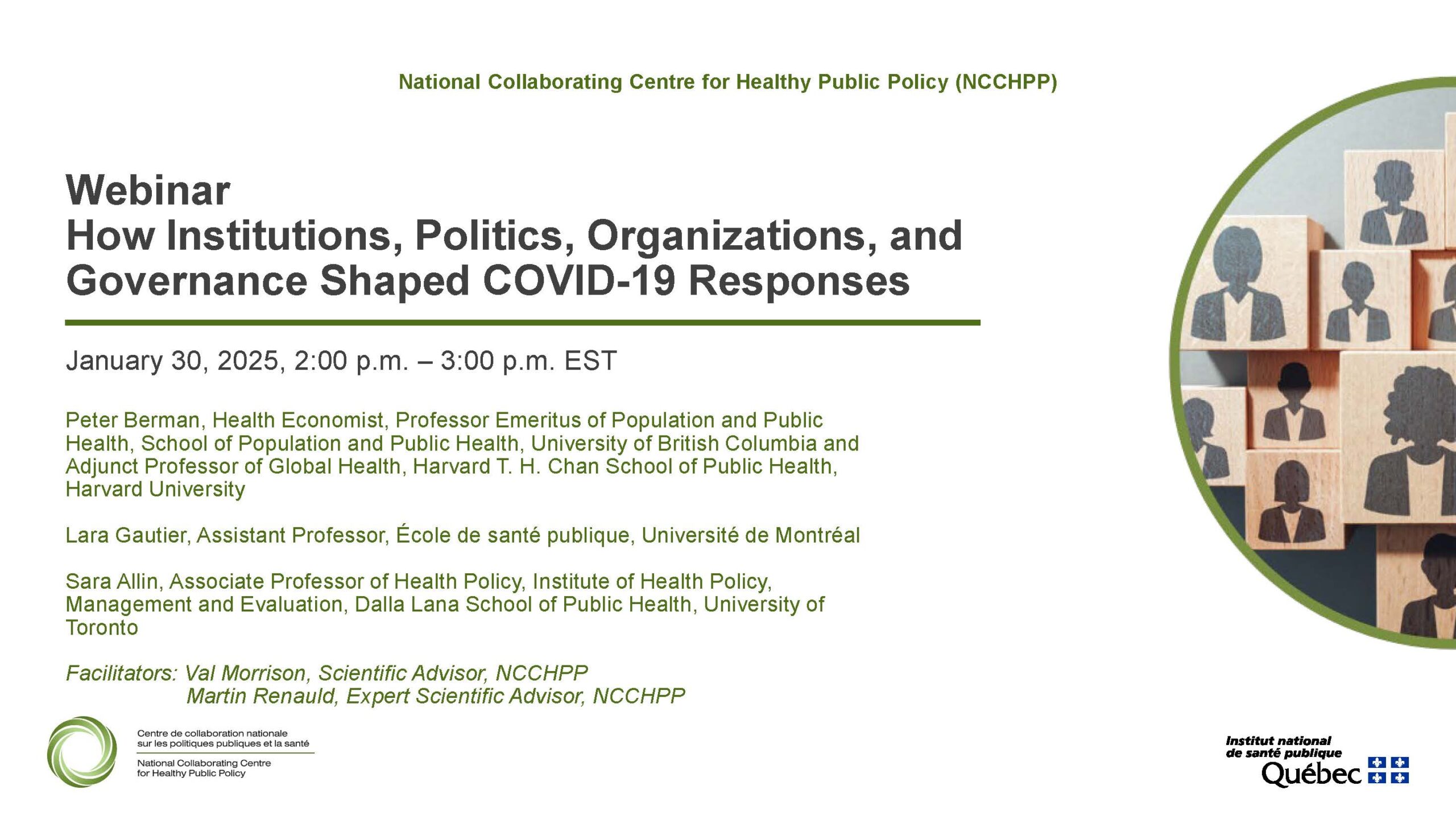DESCRIPTION
This webinar was intended to share results from the research project, Upstream determinants of effective COVID-19 response: learning from comparisons across Canada’s provinces, funded by CIHR, in which the NCCHPP is a collaborator. While research on global public health responses to COVID-19 has primarily focused on the virus’ epidemiology, transmission interventions, and their outcomes, there remains a significant gap in situating these findings within the institutional, political, and organizational contexts of different jurisdictions.
The Institutions, Politics, Organizations, Governance (IPOG) framework provides a valuable lens for understanding the complex interplay of these factors during the COVID-19 crisis. Crucial elements in the upstream context that played a significant role in influencing policy and decision making during the pandemic, these will remain important in shaping responses to future public health challenges.
The webinar introduced the IPOG framework, outlining the definitions of its components—Institutions, Politics, Organizations, and Governance. We explored how these factors interacted to influence decision making during the COVID-19 crisis, using examples from qualitative data on response decisions in British Columbia, Nova Scotia, Québec, and Ontario. The session concluded with a discussion on the need to better anticipate these interactions in future preparedness planning.
PPT Presentation
How Institutions, Politics, Organizations, and Governance Shaped COVID-19 Responses
32 slides
SPEAKERS
 Peter Berman
Peter Berman
Health Economist
Professor Emeritus of Population and Public Health, School of Population and Public Health, University of British Columbia and Adjunct Professor of Global Health, Harvard T. H. Chan School of Public Health, Harvard University
Prof. Peter Berman (M.Sc, Ph.D) is a health economist with almost fifty years of experience in research, policy analysis and development, and training and education in global health.
Recent research he has led has focused on key factors affecting government decision-making in response to public health crises examining the impact of Institutions, Politics, Organization of Public Health, and Governance (IPOG). Much of this work appears in Effective Pandemic Response: Linking Evidence, Intervention, Politics, Organization, and Governance — A World Scientific Publications Reference Set (3 Volumes), forthcoming 2024, and related journal publications. He is the editor in chief of World Scientific publications series on Global Health Economics and Public Policy (see https://www.worldscientific.com/series/wssghepp ) and author or editor of six books on global health economics and policy and more than 60 academic papers in his field and numerous other working papers and reports. He has also been closely engaged in health systems research in Ethiopia since 2012.
 Lara Gautier
Lara Gautier
Assistant Professor, École de santé publique, Université de Montréal
Lara Gautier is an assistant professor at University of Montreal’s School of Public Health and research affiliate at Centre de Recherche en Santé Publique in Montreal, QC. She is also an associate member of the French Centre Population et Développement, Ceped (IRD-Université Paris-Cité). Trained in public health and political science, her research interests lie at the intersection of implementation science, health policy and systems research, and migrant health. She has scholarly expertise in participatory health services evaluation using qualitative and mixed-method research approaches.
 Sara Allin
Sara Allin
Associate Professor of Health Policy, Institute of Health Policy,
Management and Evaluation, Dalla Lana School of Public Health, University of Toronto
Sara Allin is an Associate Professor of Health Policy at the Institute of Health Policy, Management and Evaluation, Dalla Lana School of Public Health, University of Toronto. She is also Director of the North American Observatory on Health Systems and Policies (NAO), a collaborative partnership and research centre focussed on sub-national and international health systems research to support evidence-informed policy making. Sara’s research and teaching span comparative health systems and policies, health system performance and health equity.
FACILITATORS
 Val Morrison
Val Morrison
Scientific Advisor
National Collaborating Center for Healthy Public Policy
Val has been a scientific advisor at the NCCHPP since 2008. She holds B.A. and M.A. degrees in sociology from Concordia University and pursued PhD course work and comprehensive examinations in social stratification, cultural theory, and research methodology in the sociology department at Carleton University. Her projects at the Centre have mostly been in the area of Health Inequalities: intersectionality; policy approaches to reducing health inequalities; and wicked problems. Recently, she has contributed to the project Analyzing Public Policies, by looking into public policy competencies for public health, and to the Population Mental Health and Wellness project by working on wellbeing budgets.
 Martin Renauld
Martin Renauld
Expert Scientific Advisor
National Collaborating Centre for Healthy Public Policy
Martin joined the NCCHPP in 2021 after having taught at different post-secondary institutions. He holds a BA (Bishop’s University) and a Master’s (Université de Montréal) in history as well as a political science minor (Université Laval). He completed a PhD in sociology (University of Buenos Aires) and post-doctoral work at the Chaire de recherche en Mondialisation, Citoyenneté et Démocratie (UQAM). His research has mainly focused on extractivism, citizen mobilization and collective action. At the NCCHPP, he has worked on projects related to the Health in All Policies approach and capacity building.



